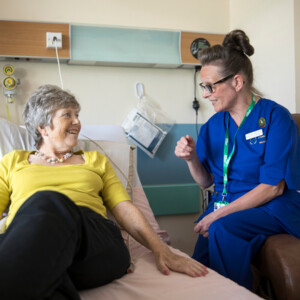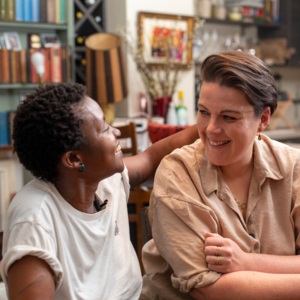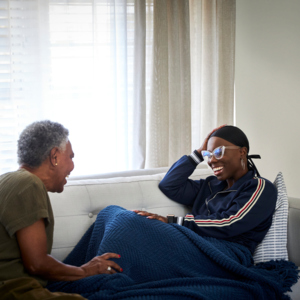
Why we need to see more women in healthcare leadership roles
To mark International Women's Day on 8th March, we will be publishing a series of blogs by guest authors throughout the month, exploring gender inequalities within healthcare.
In the final instalment of this series, Chief Nursing Officer Dr Claire Taylor MBE and Macmillan Lead Cancer Nurse Fungi Motsi, discuss the challenges and experiences for women in leadership in healthcare.
How are women represented in healthcare leadership roles?
Women comprise the majority of the nursing profession and yet they are under-represented at a leadership level. Meanwhile, men are over-represented in nursing leadership roles across the UK and have been for the last 30 years. For example, a study which reviewed workforce data from 2017 found that although men made up only 11% of the profession, they held almost one in five of the top jobs (Punshon et al, 2019). In Northern Ireland, men made up just 6.6% of the workforce but held 27.5% of the highest paid “very senior manager” grade jobs. These findings were reflected across all four UK countries with male nurses appearing to be over-represented at higher Pay Bands within the UK NHS compared to the population average.
A recent paper suggests there are multiple complex and interacting factors behind this, including gender stereotyping and systemic issues, such as organisational structure and support (Surangi et al, 2024). More specifically in cancer care, a workforce report suggests women face gender-based discrimination (Lancet, 2023). This may be particularly important for women from Ethnically Diverse backgrounds in white-majority countries because they lie at the intersection of two historically marginalised groups: women and people who are Ethnically Diverse. A survey carried out by the Royal College of Nursing of more than 10,000 nursing staff from across the UK reported that White nursing staff and those of mixed ethnic background across all age groups were more likely than Black and Asian colleagues to have received at least one promotion since starting their nursing career (RCN, 2021).
" I was driven to create networks of support which have helped me to define my own career"
Healthcare leadership through the eyes of Fungi Motsi, Macmillan Lead Cancer Nurse
I recently spoke with Fungi Motsi, Macmillan Lead Cancer Nurse at the George Eliot Hospital in Nuneaton. Fungi has been a nurse for 22 years – and has spent 14 of these as a Macmillan Professional, including seven in her current role.
Fungi has been ambitious from the outset of her career, leaving Zimbabwe at the age of 18 to come to England to study nursing. As a Project 2000 graduate (a new preparation for practice for nurses), she finished her 3 years with a diploma alongside a registered nurse qualification. Soon after this, she completed further qualifications in cancer care which enabled her to progress from staff nurse to ward sister and then into management. She is now studying for an MBA.
“On the ward, when opportunities to progress - or to learn and develop, like getting involved in research - came up, I would always put myself forward. I’m grateful to the people in my career who saw my potential and encouraged me – this includes my first ward manager in the earlier days of my career, but also more senior colleagues who I admired and felt I could identify with later down the line. Now I’m in a position where I feel I can seek advice at Chief Executive level.”
“There were times when I felt nursing was quite a lonely experience, so I was driven to create networks of support which have helped me to define my own career prospects. I was fuelled by my curiosity, as well as my desire to take on new projects and stretch myself, so this has helped me to make connections and allow opportunities for development relatively quickly. I was then able to look for promotion opportunities and I really had my sights set on a leadership role. However, that part wasn’t quite as easy as I had hoped. On one occasion, I was given feedback that I had interviewed well, but then found out that I didn’t get the post with no clear rationale why. It was disappointing, but I did later succeed and secure this role in another Trust and over the years I’ve learned to look at things that are within my control and focus on looking forward”.
I really admire Fungi’s commitment to continuing to strive to progress in her career, especially in the face of cultural and structural barriers. Her expertise, skill set and ability to deliver across systems in what is a complex and multi-faceted role is testament to her grit and determination.
The Lead Cancer nursing role is a role that many cancer nurses aspire to - and now, through her coaching and mentoring, Fungi is generously helping develop many other nurses’ careers enabling them to step up into their next role.
Championing future female leaders in healthcare
In looking to help other women maximise their career opportunities in cancer nursing and progress to a leadership role, we need solutions that work at both an individual and systemic level. Pathways that develop nursing leadership and nurse leaders need to be fostered and implemented. This is why Macmillan is co-delivering the ACCEND programme, as referenced in the NHS Long-term Workforce Plan (2023), which aims to support aspiring cancer nurses and allied health professionals towards increasing their knowledge, skills and capability across four pillars of practice – including leadership (NHSE, 2024). It provides the existing cancer workforce with access to the education and training that is needed to match the competencies required for their role across all levels of practice, including the most senior leadership roles.
But we need to go further, since inequalities are still embedded in our social and organisational structures and systems. One of the most important factors influencing gender inequity in the healthcare workforce is a lack of broad representation of women among leaders at every level. It is essential that everyone is able to see people ‘like them’ and that they have tangible role models. So, we also need schemes that increase diversity within the oncology nursing workforce and empower people from marginalised groups to progress in their careers, so that the future leaders of the profession truly reflect the people that the workforce serves.
About our information
-
1. Ginsburg O, Vanderpuye V, Beddoe AM. (2023) Women, power, and cancer: a Lancet Commission, Lancet 402: 2113–66
2. NHSE Aspirant Cancer Career and Education Development programme | Health Education England (hee.nhs.uk)
3. NHS Long-term workforce plan (2023) Available at: NHS England » NHS Long Term Workforce Plan
4. Punshon G, Maclaine K, Trevatt P. et al (2019). "Nursing pay by gender distribution in the UK - does the Glass Escalator still exist?". International Journal of Nursing Studies. 93: 21-29.
5. RCN, 2021
6. Surangi De Silva M, Baduge P, Garth B. et al (2024) Barriers to advancing women nurses in healthcare leadership: a systematic review and meta-synthesise. eClinicalMedicine 67, 102354
7. Project 2000, UKCC: A new preparation for practice, 1 January 1986, ISBN 0951144006





